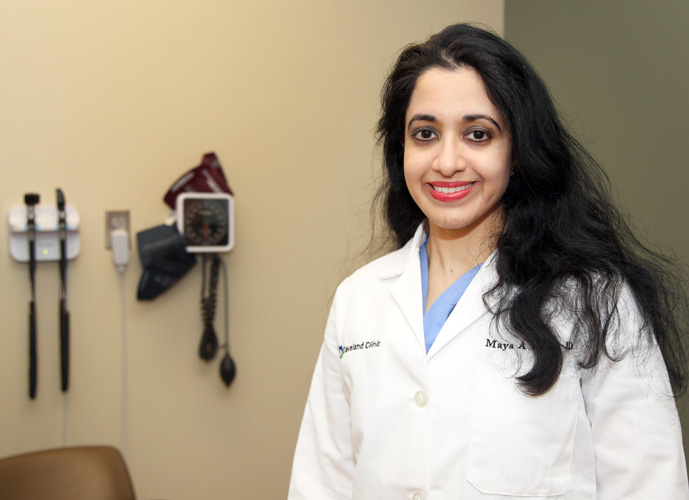Here are five words that can stop just about anyone in their tracks.
“You have a brain tumor.”
Today, according to the American Brain Tumor Association, “over 700,000 Americans are living with a brain tumor and nearly 80,000 more people will be diagnosed with a primary brain tumor this year.”
Treating brain tumors is complex but Dr. Maya Babu, a graduate of Harvard Medical School with fellowships at Miami’s Ryder Trauma Center in Neurotrauma and the Mayo Clinic in Neurocritical Care (as well as a Mayo Clinic residency in Neurosurgery), adroitly explains what may be in store for those who are diagnosed with the condition.
In her office at Cleveland Clinic Tradition Hospital in Port St. Lucie, this engaging neurosurgeon freely admits that “panic-stricken” can be an accurate description of those who’ve just received a brain tumor diagnosis. But she quickly points out that the earlier these tumors are diagnosed, the better the odds of successfully treating them.
The National Brain Tumor Society agrees. It says “while it is normal to feel scared, insecure, or angry about a brain tumor diagnosis, you can empower yourself to cope by taking this one step at a time. Start gathering information. Talk to everyone who can be a resource to you. No question is too trivial,” and that is a sentiment Babu wholeheartedly endorses.
Headaches can be one of the earliest signs of a possible problem, says Babu, something many of us ignore or take too lightly.
“Headaches,” she continues, “that don’t go away. You try taking Tylenol, Ibuprofen, what have you, and the headache just doesn’t go away; or headaches that happen with frequency – meaning every morning when you wake up you have a headache and you notice it may get [a little] better over the course of the day, but it’s just constant.”
If that sounds at all familiar, Babu says, “you should have it checked out. Oftentimes you see your primary care physician. He or she will start you on some medication and if it persists, then you usually get a scan.”
Simply put, a brain tumor is a mass or growth of abnormal cells in or near your brain. But it’s not really all that simple.
The American Brain Tumor Association says “there are more than 120 different types of primary brain tumors” or tumors that begin in the brain – but that figure doesn’t include tumors from cancers formed in other parts of the body (including breast cancer, colon cancer, kidney cancer, lung cancer and skin cancer) that can metastasize and spread to the brain.
The good news, as the Mayo Clinic points out, is that having a tumor doesn’t necessarily mean cancer. “Some brain tumors,” it says, “are noncancerous or benign.”
Babu pauses at the word “benign.”
Meningioma [tumors], for example, are considered benign, but this neurosurgeon sees them in a somewhat different light.
“I hate the term benign [for meningioma tumors],” says Babu, raising her voice ever so slightly for the first time. “They’re considered benign because they don’t travel to other parts of the body, but they can still be locally aggressive and a problem, depending upon where they are and their size, et cetera. And they are fairly common.”
The good news? According to Babu, “a grade-one meningioma still has a very good prognosis in terms of longevity of life. There’s essentially no impact, no negative impact.”
Unfortunately, meningioma is only one of the many different types of primary and metastatic tumors that could be present in the brain.
Still, Babu and Cleveland Clinic have some numbers on their side, too.
With more than 40 in-house clinical departments and centers now in the state of Florida, Cleveland neurosurgeons like Babu can draw from the expertise of any number of specialists in diagnosing and treating brain tumor patients. In addition, as Babu points out, all of pathology specimens taken here are also sent to the main Cleveland Clinic in Ohio for “over-reads.”
“If there’s any sort of a question of what this is, it goes through specialized testing out there as well,” Babu says. “That, I think, is really reassuring,” both for the physician and the patient.
“People should have confidence that we won’t do things just because of our desire or ease or convenience,” she adds. “We will do what’s best for the patient. If you need a specialized study [or] trial that we don’t offer, we will help connect you.”
Doing what’s best for the patient includes “world-class care” from throughout the entire Cleveland Clinic system, whether that means surgery, radiation treatments, immunotherapies or a host of other options.
In other words, if you take the National Brain Tumor Society’s advice and “talk to everyone who can be a resource to you,” a visit to a neurosurgeon like Babu should probably be near the top of your list.
Dr. Maya Babu is a neurosurgeon with Martin Health and Cleveland Clinic Tradition Hospital in Port St. Lucie at 10050 SW Innovation Way, Suite 102 in Port St. Lucie. The phone number is 772-288-5862.

